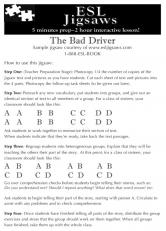ESL Jigsaws
5 Minutes Prep - 2 Hour Interactive Lesson!
Viewing entries tagged with 'EFL'
Soft Skill: Who Picks Up the Bill?
We often think of bargaining language as confined to situations like a garage sale or to the purchase of larger items like cars or homes. One of the most common negotiations most people will engage in at some point is who will pay the bill in a restaurant. Not only are there language and soft skills specific to this situation, many cultural assumptions are thrown into the mix. Countries, as well as the cultures within them, differ in their norms about who should pick up the tab and when. Learning the related idioms and other bargaining language but not cracking this cultural code and developing the soft skills to successfully navigate this interaction can lead to social awkwardness as exemplified in the story below.
Murder in the Parking Garage
In 2011 I wrote about teaching about death in the ESL / EFL / ELL classroom. Students know that they need the soft skills required to respond to news about a death. The Widow jigsaw in Contemporary Jigsaws 1 and 2 works as an effective springboard for this topic. While it focuses on the passive voice, there’s lots of scope for other grammar points. Here’s a suggestion of some follow up activities. Start with explaining the differences between the following and you will have students full attention:
Environmental Jigsaw for Higher Levels
When choosing a jigsaw that is appropriate for the level of your class, it’s important to remember that jigsaws are not passive reading exercises. These four skills lessons require the students to not only read their part, but to teach it to their classmates. Pronunciation and listening skills are key.
Collective Nouns for Animals for Intermediate Level
I've taken a moment to make a test of English for you, the ESL or EFL teacher, for fun! Let's see how well you do! Simply choose the correct collective noun.
Fieldtrip to the Dentist
In adult immigrant ESL classes, within a health unit, many teachers touch on the subject of dental care. I highly recommend a visit to an actual dentist’s office, if you can arrange it. My dentist Dr. Marcy Schwartzman was kind enough to allow a visit to her dental clinic for my intermediate ESL students, many of whom had never been to a dentist in their lives.
Teaching About Christmas?
Imagine you are teaching abroad for a year in the country of Slavarnia, spending part of your time in classes learning the language of Slavar. It's not a real country so follow along with this hypothetical example. The biggest holiday of the year is called Glistin. Stores close and there are two statutory holidays associated. Hallmark has commercialized Glistin significantly, creating a large gift giving fairy as the main character. But actually, the roots of the holiday are religious. When the subject of the holiday comes up in class, you read and played games centred around the Hallmark fairy, but learn nothing about the historical and religious origins of the holiday. Apparently, the school is concerned about religious proselytizing and so keeps the focus on the secular aspects. As a result, you remain in the dark about half of the holiday's significance. You have no interest in converting your religion, but just want to understand what is behind the holiday.
Cultural Differences in Gift Giving
One of the most important things we can do as ESL teachers is to help our students crack the cultural code. Gift giving has a lot of unspoken rules which may seem inscrutable to newcomers. Unconvinced? See if you were aware of these cultural attitudes to gift giving in other cultures:
Halloween Noodles
I’ve heard some teachers say that their students were not interested in participating in Halloween. Many others feel that malls are safer locations for children to go trick or treating these days. Here’s a true story of an adult ESL student of mine from Taiwan and her first Halloween here, to illustrate my view that the neighbourhood tradition of trick or treating is a worthwhile one we should teach students about.
Teaching about Labor / Labour Day
If you are teaching ESL to immigrants or EFL to VISA students and the topic of Labor Day in the United States or Labour Day in Canada comes up, you may find that your students also celebrate a day for workers in their home countries, but that day is usually on May 1st. A national holiday in over 80 countries, May 1st is also celebrated unofficially in many more.
Teaching Food at Higher Levels
If you're like me, you like to teach your food unit during the summer when the grocery stores are full of fresh produce and farmers' markets are in full swing.


